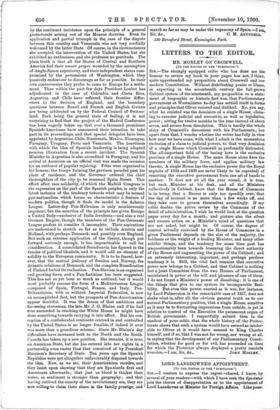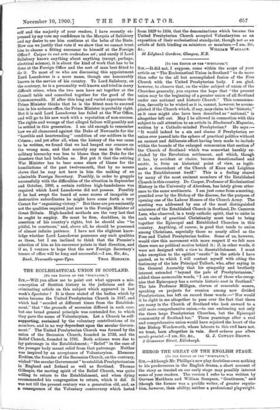LORD LANSDOWNE'S APPOINTMENT.
[To THE EDITOR OS THE "SPECTATOR."] Sts, I venture to express the regret—shared, I know, by several of your readers—with which I have seen the Spectator join the chorus of disapprobation as to the appointment of Lord Lansdowne as Minister for Foreign Affairs. Like your• self and the majority of your readers, I have recently ex- pressed by my vote my confidence in the Marquis of Salisbury and my desire to see him continue at the helm of the State. How can we justify that vote if we show that we cannot trust him to choose a fitting successor to himself at the Foreign Office ? Cuique in sud ante credendum est ; and surely if Lord Salisbury knows anything about anything (except, perhaps, electrical science), it is about the kind of work that has to be done at the Foreign Office and the sort of man best fitted to do it. To most of us who are discussing this appointment Lord Lansdowne is a mere name, though one honourably known in the service of his country. To Lord Salisbury, on the contrary, he is a personality well-known and tried in many difficult crises, when the two men have sat together at the Council table and consulted together for the good of the Commonwealth. If after this long and varied experience the Prime Minister thinks that he is the fittest man to succeed him in his arduous office, the Prime Minister is probably right. But it is said Lord Lansdowne has failed at the War Office, and will go to his new work with a reputation of non-success. The rights and wrongs of that alleged failure will possibly not be settled in this generation. I am old enough to remember how we all clamoured against the Duke of Newcastle for the "horrible and heartrending" condition of our soldiers in the Crimea ; and yet after all, when the history of the war came to be written, we found that we had heaped our censure on the wrong man, and that scarcely any man in the whole military hierarchy was less to blame than the Duke for the disasters that had befallen us.. But put it that the retiring War Minister has to bear some share of blame for the humiliations of the past twelvemonth, that by no means shows that he may not have in him the making of an admirable Foreign Secretary. Possibly, in order to grapple successfully with the difficulties of the situation in September and October, 1899, a certain ruthless high-handedness was required which Lord Lansdowne did not possess. Possibly if he had swept the board of some scores of incapable or destructive subordinates he might have come forth a very Carnot for " organising victory." But these are pre-eminently not the qualities required just now in the Foreign Minister of Great Britain. High-handed methods are the very last that he ought to employ. He must be firm, doubtless, in the assertion of his country's rights, but he should also "be pitiful, be courteous," and, above all, he should be possessed of almost infinite patience. I have not the slightest know- ledge whether Lord Lansdowne possesses any such qualities as these, but I am inclined to think that the Premier's selection of him as his successor points in that direction, and if so, I venture to hope that the new Foreign Secretary's tenure of office will be long and successful.—I am, Sir, &c.,







































 Previous page
Previous page